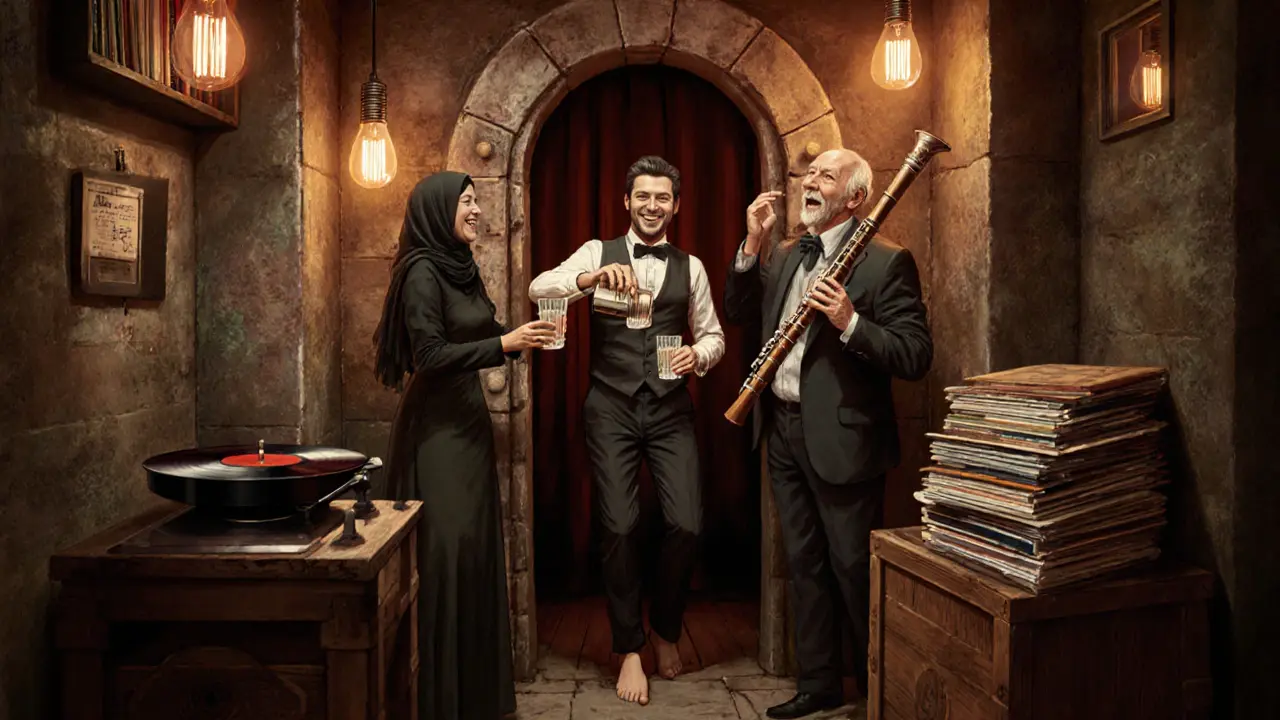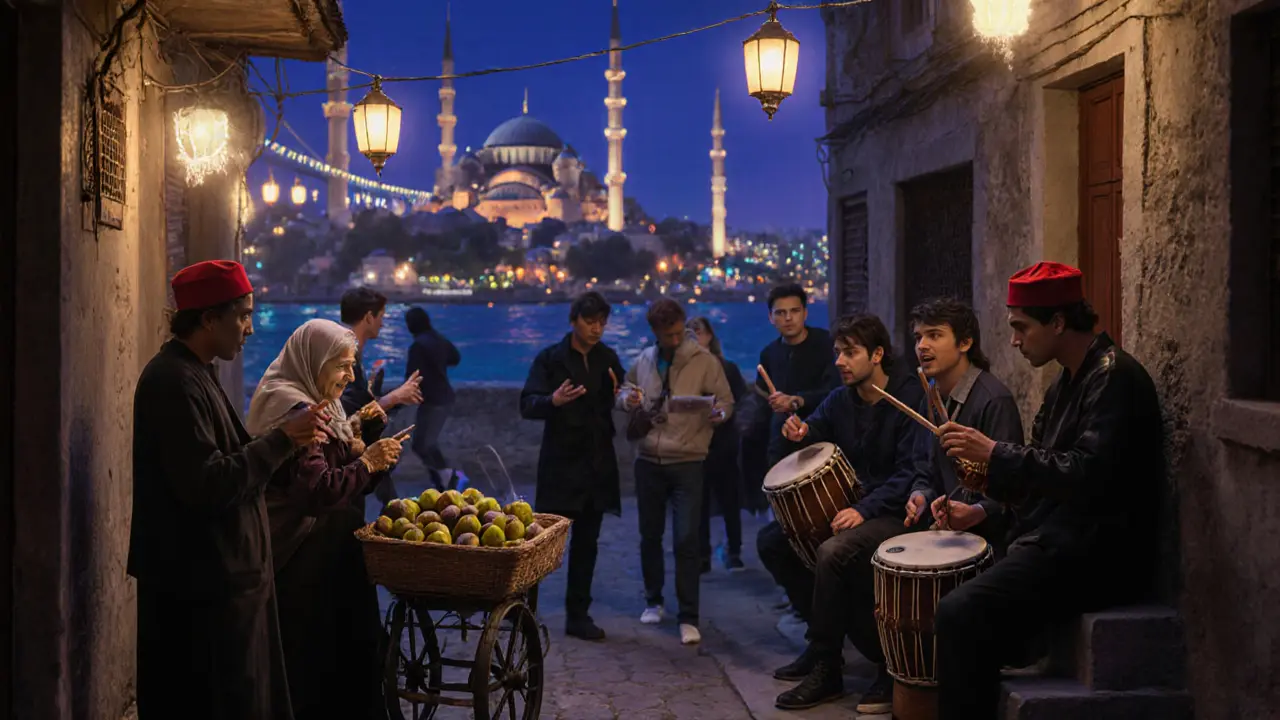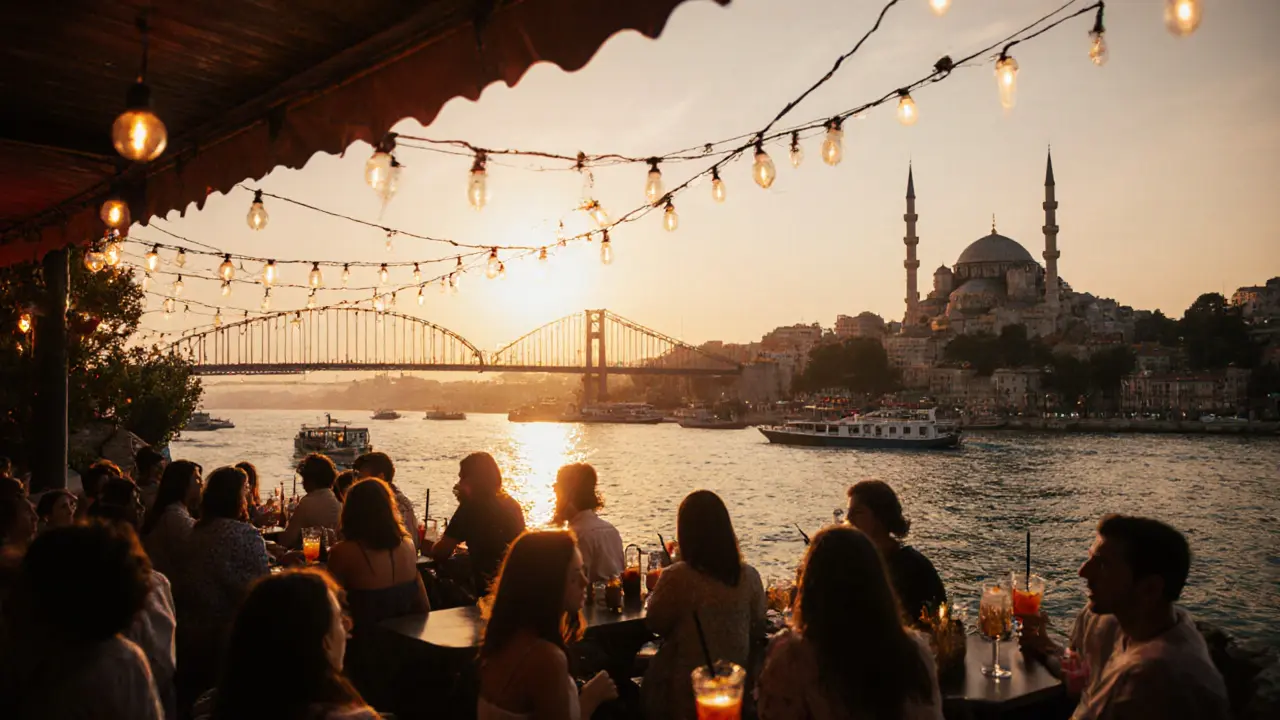When the sun sets over the Bosphorus, Istanbul doesn’t just quiet down-it transforms. One minute you’re sipping tea in a centuries-old çay bahçesi, the next you’re dancing to live saz music under neon lights in a basement club where the scent of kebabs still lingers in the air. This city doesn’t choose between East and West-it mashes them together, and the result is one of the most electric, unexpected nightlife scenes on the planet.
Where the Call to Prayer Meets Bass Drops
In Beyoğlu, the heart of Istanbul’s nightlife, you can hear the adhan echoing from the nearby Camlica Mosque while a DJ spins deep house in a converted Ottoman warehouse just 200 meters away. It’s not a contradiction-it’s the rhythm of the city. Nightlife here isn’t split by religion or tradition; it’s layered. On a Friday night, you might start at Reina, the iconic riverside club with panoramic views of the Bosphorus, where locals and tourists sip raki cocktails under string lights. By midnight, you’re hopping to Karaköy, where indie bands play in candlelit basements and the crowd is a mix of art students, expats, and retired jazz musicians who still know every note of Frank Sinatra.
What makes Istanbul different isn’t just the variety-it’s the lack of boundaries. You won’t find strict dress codes or velvet ropes here. A woman in a hijab might be next to you at the bar, laughing as she takes a shot of raki. A man in a tailored suit might be the one dancing barefoot on the table. The rules? There aren’t any. Just respect, music, and the unspoken understanding that this city never sleeps, but it also never rushes.
From Rooftop Lounges to Underground Speakeasies
There’s no single "best" night out in Istanbul-only the right one for your mood. If you want glamour, head to 360 Istanbul on the 36th floor of the Swissôtel. The skyline lights up like a jewel box, and the cocktails are crafted with Turkish herbs like sumac and rose petal syrup. But if you’re after something raw, head to Bar 1927 in Karaköy. Hidden behind a fridge door in an old bank vault, it’s a speakeasy that feels like stepping into a 1920s Istanbul novel. The bartender knows your name by the third drink, and the playlist blends Turkish folk with vinyl-only jazz from the 70s.
For those who crave live music, Leb-i Derya in Nişantaşı is where Istanbul’s jazz scene thrives. It’s not a tourist trap-it’s where local legends like pianist Murat Ertel play with the kind of soul that only comes from decades of playing in smoky rooms. You won’t find a menu with 50 cocktail options here. Just one: the house raki, served with a slice of lemon and a side of silence before the first note.

The Food That Keeps the Night Alive
Forget the idea that nightlife means only drinks. In Istanbul, the night is fed. At 2 a.m., when the clubs are still pumping, you’ll find lines outside Çiya Sofrası in Kadıköy, where the owner serves 30 types of meze-some you’ve never heard of-like stuffed quince, wild mint dumplings, and smoked eggplant with pomegranate molasses. It’s not just food. It’s a ritual. You eat slowly. You talk louder. You order another round.
And then there’s the balık ekmek boats along the Eminönü docks. Grilled mackerel in a crusty roll, squeezed with lemon, eaten standing up as the ferries glide past. It’s the kind of meal you only have after midnight, when the city feels like it’s yours alone. Tourists miss it. Locals know it’s the real nightcap.
How the City Keeps It Real
Some cities shut down after 2 a.m. Istanbul? It wakes up. Police don’t raid clubs unless there’s noise complaints past 4 a.m. And even then, they’ll often just sit down, have a coffee, and ask the DJ to turn it down a notch. There’s a reason for this tolerance: Istanbul understands that culture isn’t contained. It spills out of clubs, onto balconies, into alleyways where oud players improvise with street drummers.
The city’s nightlife isn’t curated for Instagram. It’s lived. You’ll find a 70-year-old woman selling fresh figs from a cart next to a 22-year-old rapper recording a track on his phone. You’ll see a group of university students arguing about Sufi poetry while sipping cold brew espresso. None of it feels forced. It just is.

What You Should Know Before You Go
If you’re planning a night out in Istanbul, here’s what actually matters:
- Start late. Most places don’t fill up until after 11 p.m.
- Bring cash. Many small bars and underground spots don’t take cards.
- Try raki. It’s the national drink. Dilute it with water-it turns milky white and tastes like anise and summer nights.
- Don’t expect silence. Istanbul’s nightlife is loud, warm, and full of conversation.
- Wear comfortable shoes. You’ll be walking-up hills, across bridges, through narrow alleys.
And skip the tourist traps in Taksim Square after midnight. The real magic is in the side streets-Karaköy, Cihangir, Nişantaşı’s back alleys, and the waterfront lanes of Beşiktaş.
The Real Secret of Istanbul’s Nightlife
The secret isn’t the music, the drinks, or even the views. It’s the way the city holds two worlds at once-ancient and modern, sacred and wild, quiet and roaring-and lets them exist without apology. You don’t come to Istanbul to escape your own culture. You come to see how another culture can hold contradictions without breaking.
That’s why, at 3 a.m., you’ll find a group of friends singing along to a Turkish pop song while a man in a fez plays a ney flute beside them. No one thinks it’s strange. Because in Istanbul, the East and West don’t blend. They dance together-and no one’s in a hurry to stop.
Is Istanbul nightlife safe for tourists?
Yes, Istanbul’s nightlife is generally safe for tourists, especially in popular areas like Beyoğlu, Karaköy, and Beşiktaş. The city has a strong police presence at major nightlife hubs, and locals are often helpful if you seem lost. Avoid isolated streets late at night, stick to well-lit areas, and don’t carry large amounts of cash. As long as you use common sense, you’ll find the people here welcoming and the atmosphere relaxed.
What time do clubs in Istanbul usually close?
Most clubs in Istanbul stay open until 5 a.m., and some even until 7 a.m. on weekends. Popular spots like Reina, Numa, and Kasa often hit their peak between 2 a.m. and 4 a.m. There’s no strict legal closing time, but noise ordinances mean venues usually wind down by dawn. If you’re planning to stay out late, expect to be one of the last ones standing.
Do I need to dress up for Istanbul nightlife?
No. Istanbul’s nightlife is famously casual. You’ll see everything from designer dresses to ripped jeans and sneakers. Upscale venues like 360 Istanbul or Reina may have a slightly smarter crowd, but there’s no dress code. What matters more than what you wear is how you carry yourself-respectful, open, and ready to enjoy the moment. Modest clothing is appreciated near mosques, but not required in clubs or bars.
Can I find English-speaking staff in Istanbul clubs?
In tourist-heavy areas like Beyoğlu and Karaköy, most bartenders and club staff speak basic to fluent English. In smaller, local spots-especially in Cihangir or Nişantaşı-you might need to point or use gestures. But that’s part of the charm. Many locals appreciate the effort you make to learn a few Turkish phrases like "Teşekkür ederim" (thank you) or "Bir raki lütfen" (one raki, please).
Are there any night markets or late-night food spots?
Absolutely. The Kadıköy market stays open until 2 a.m. on weekends, serving grilled corn, simit, and fresh pomegranate juice. In Eminönü, the balık ekmek boats are a must at any hour. For something warmer, try the late-night döner spots in Şişli or the 24-hour börek houses in Fatih. Food is never far away in Istanbul’s night, and it’s often the highlight of the evening.
